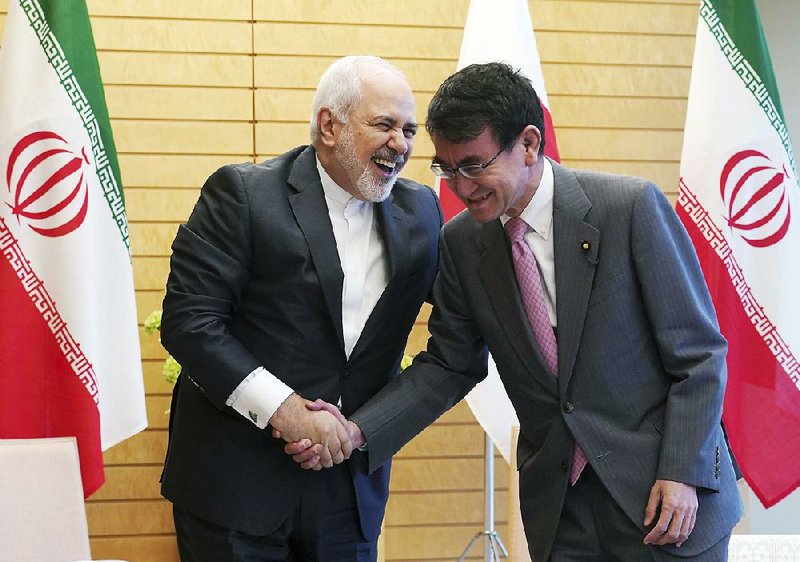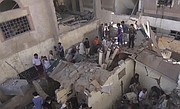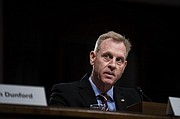WASHINGTON -- Congressional leaders received a classified briefing on Iran as members of both parties demand more information on the White House's claims of rising threats in the Middle East.
The briefing Thursday with the so-called Gang of Eight came after Democratic lawmakers warned President Donald Trump against war with Iran and criticized the White House for not keeping Congress informed of the rising threat.
Asked Thursday at the White House if escalating tensions with Iran will lead to war, Trump replied: "I hope not."
Trump pulled the U.S. out of the 2015 Iran nuclear deal last year and has re-imposed sanctions on Tehran that are crippling its economy.
U.S. officials are reporting heightened threats in the region from Iran and have sent military assets there to protect U.S. troops and the interests of America and its allies.
State Department officials said threats in the region are credible and based on intelligence showing that Iranian-backed militias have been moving personnel and weaponry as well as stepping up surveillance of U.S. and U.S.-affiliated facilities in Iraq and other parts of the Middle East. The officials were not authorized to comment publicly by name and spoke only on condition of anonymity.
The administration's warning about Iran is being met with skepticism in the U.S. and among foreign allies, a legacy of the 2003 invasion of Iraq that was based on false intelligence. The skepticism extends to Congress, where lawmakers have largely been kept in the dark.
The Senate will receive a classified briefing on Iran on Tuesday, according to Sen. Jim Risch of Idaho, the chairman of the Senate Foreign Relations Committee. The House has requested a classified briefing as well.
House Speaker Nancy Pelosi, a member of the Gang of Eight, said briefings are necessary because informing leaders "is no substitute for the full membership of the Congress." She said a failure to inform Congress is "part of a pattern" for the Trump administration "that is not right" because the power to declare war resides with Congress.
"So I hope that the president's advisers recognize that they have no authorization to go forward in any way" against Iran, Pelosi said.
Trump, meanwhile, has told his acting defense secretary, Patrick Shanahan, that he does not want to go to war with Iran, according to several administration officials, in a message to his hawkish aides that an intensifying U.S. pressure campaign against the clerical-led government in Tehran must not escalate into open conflict.
Trump's statement, during a Wednesday morning meeting in the Situation Room, came during a briefing on the rising tensions with Iran.
No new information was presented to the president at the meeting that argued for further engagement with Iran, according to a person in the room. But Trump was firm in saying he did not want a military clash with the Iranians, several officials said.
The president has sought to tamp down reports that two of his most hawkish aides -- the national security adviser, John Bolton, and Secretary of State Mike Pompeo -- are spoiling for a fight with Iran and are running ahead of him in precipitating a military confrontation.
"There is no infighting whatsoever," Trump said in a tweet Wednesday evening. "Different opinions are expressed, and I make a decisive and simple decision -- it's a very simple process. All sides, views, and policies are covered."
But Trump added that he is confident Iran "will want to talk soon," signaling an openness to diplomacy that officials said is not shared by Bolton or Pompeo.
The president's professed hopes for a dialogue with Iran seem unlikely to produce a breakthrough any time soon. In Tokyo, Foreign Minister Mohammad Javad Zarif of Iran said there was "no possibility" of discussions with the administration to ease the tensions, Agence France-Presse reported.
"The escalation by the United States is unacceptable," Zarif told reporters.
Iran's vice president said the country could consider talks with the Trump administration if it first returns to the 2015 nuclear deal and ends its sanctions.
"If they go back to the original position that they had at the beginning of their government then yes, it can be considered," Masoumeh Ebtekar said in an interview at her office in Tehran earlier this week. The accord is "a clear framework and agreement, and it complies with the expectations the American president recently mentioned -- that Iran doesn't attempt to seek nuclear weapons," she said.
That echoes an argument made by America's own allies in Europe, which remain supportive of the hard-won diplomatic agreement as the best way to engage Iran on other issues of concern, such as its regional policies. Iran last week said it would stop fully abiding by its enrichment obligations under the deal if economic benefits can't be secured.
DRONE-ATTACK BLAME
Separately, Saudi Arabia on Thursday blamed Tehran for a drone attack by Yemen's rebels that knocked out a key oil pipeline, adding a new layer of tension to the standoff in the Persian Gulf.
Tensions have flared after four oil tankers were targeted in sabotage attacks Sunday off the coast of the United Arab Emirates and drones struck a Saudi oil pipeline Tuesday in an attack claimed by Iran-aligned Houthi rebels in Yemen.
Prince Khalid Bin Salman, the vice minister for defense and brother of Saudi Arabia's crown prince, said on Twitter that Tuesday's drone attack undermined efforts to heal the divided country.
"The terrorist acts, ordered by the regime in Tehran, and carried out by the Houthis, are tightening the noose around the ongoing political efforts," Prince Khalid said. "These militias are merely a tool that Iran's regime uses to implement its expansionist agenda in the region."
His comments came as Saudi-led forces launched retaliatory airstrikes against Houthi positions in Yemen, where the United Nations is working to end a four-year war that's killed thousands and left millions facing hunger and disease.
The Houthi attacks on two Aramco oil pumping stations forced an important east-west pipeline in the kingdom to close and added to friction in the Persian Gulf, where the U.S. has tightened sanctions against Iran, demanding it stop supporting paramilitary groups across the Middle East, including the Houthis.
The pipeline has since reopened, but officials from all sides are warning that a string of recent events have pushed the region closer to a potentially devastating conflict.
An Arab News editorial, published in English, called for the U.S. to carry out "surgical" strikes on Iran. The editorial said it's "clear that [U.S.] sanctions are not sending the right message" and that "they must be hit hard," without elaborating on what specific targets should be struck.
A senior diplomat from the United Arab Emirates said late Wednesday that it was "very committed to de-escalation" after the alleged sabotage of the oil tankers off its coast. The UAE is a close Saudi ally and a leading member of the coalition fighting in Yemen.
Anwar Gargash, the UAE minister of state for foreign affairs, declined to directly blame Iran for the attack, but he repeatedly criticized Tehran. Officials have not said who they think was behind the tanker attacks, which did not cause any injuries.
Information for this article was contributed by Susannah George, Matthew Lee, Padmananda Rama, Aya Batrawy, Mari Yamaguchi, Ahmed Al-Haj and Jon Gambrell of The Associated Press; by Eric Schmitt, Maggie Haberman and Mark Landler of The New York Times; and by Golnar Motevalli, Salma El Wardany, Lin Noueihed, Jessica Shankleman, Zainab Fattah and Ladane Nasseri of Bloomberg News.
A Section on 05/17/2019



